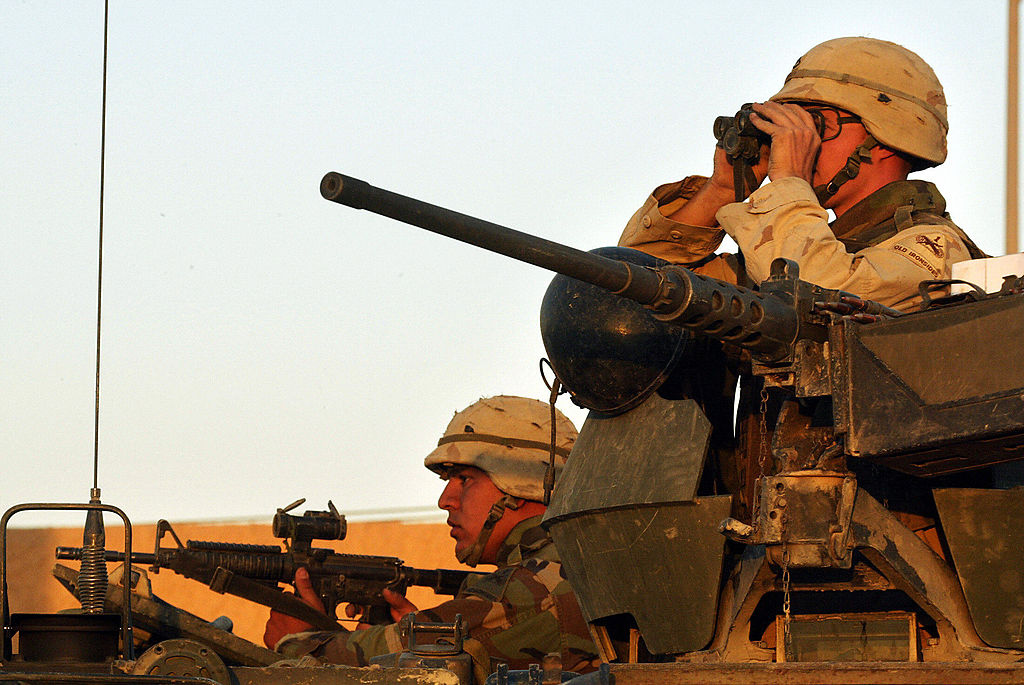Saddam Hussein was executed at the gallows in 2006 — but the Authorization for the Use of Force used by the US military to topple his regime in Iraq is still alive and kicking, a legacy the Pentagon has been loath to bury along with that war.
That legislation, passed in October ahead of the March 2003 invasion of Baghdad, authorized then-president George W. Bush to use the Armed Forces of the United States ‘as he determines to be necessary and appropriate’ in order to ‘defend the national security of the United States against the continuing threat posed by Iraq; and enforce all relevant United Nations Security Council Resolutions regarding Iraq’.
The war stretched on for years after Hussein was killed and morphed into a sectarian conflict that drew in al-Qaeda, gave birth to the Islamic State in Iraq, and long outlasted its original mandate. For more than five years there have been efforts on Capitol Hill to repeal the 2002 AUMF so it couldn’t be used to justify more military actions overseas that were not explicitly approved by Congress — like when the Trump administration used it in part to assassinate Iranian general Qasem Soleimani in January 2020. It’s obvious now that the Pentagon has been a big impediment to repeal, with top officials saying they needed the AUMF to ‘windup’ operations long after the war ended. Clearly the US military hates to give up its weapons, even the obsolete paper ones.
But it looks like it’s finally losing its grip. The votes and the stars appear aligned to sweep away the legislation, which has given the White House and military a virtual blank check for operations in Iraq for nearly two decades, along with the rest of the bad war memories. And it’s got bipartisan buy-in. The House is set to vote on a measure by Rep. Barbara Lee — who voted against the original bill in 2002 — on Thursday that would repeal the authorization for good. Joining her among 139 current co-sponsors are 10 Republicans. That short list includes freshmen Reps. Nancy Mace of South Carolina, and Peter Meijer of Michigan, an Iraq War veteran who says repealing the measure is ‘constitutional hygiene’.
While naysayers claim that any repeal would leave forces vulnerable in the field, the continued support of conservative groups like Americans for Prosperity have given it political cover. In a letter sent to Congress this week, AFP framed the repeal as another way of getting US troops out of ‘harm’s way’.
This, they said, ‘will remove the ability for any continued abuse of the authorization, begin to restore Congress’ role in matters of war and peace, and force more Congressional debate over when, if, and (most importantly) why we send American troops into harm’s way’.
A companion bill in the Senate introduced by Sens. Todd Young and Tim Kaine has three Republicans among 16 co-sponsors, including Sens. Lisa Murkowski of Alaska, Chuck Grassley of Iowa and Rand Paul of Kentucky.
Even the staid conservative Heritage Foundation, in the form of a January 2020 report, supports the repeal, calling the authorization ‘outdated’ and presenting its removal as a chance for Congress to start flexing its Article I war powers again. Conservative veterans, too, have come out strong for repeal.
‘For many veterans, it is incredibly disappointing to see their friends and family members continuously deployed in support of missions that most members of Congress don’t even have the courage to debate or vote on,’ said Dan Caldwell, senior adviser for the conservative Concerned Veterans for America, and an Iraq War vet. ‘Repealing the 2002 AUMF would be a small but important step for Congress in reasserting its role in shaping American foreign policy.’
It’s a ‘small step’ because the big dragon to slay is the 2001 AUMF, which was passed after the 9/11 attacks to pursue the perpetrators, along with those who harbored them whether they be individuals or state- and non-state actors. Over time that authorization has been interpreted to include the Taliban, al-Qaeda, Isis and a host of off-shoots across the Middle East and North Africa that the executive branch and the Pentagon have deemed under the umbrella with little congressional oversight.
‘One of the talking points being used by proponents of repeal is that getting rid of the 2002 AUMF will not affect ongoing military operations. So my question is, what are we accomplishing then?’ charged Dan McKnight, veteran and founder of Bring Our Troops Home.
‘If our goal is to bring our troops home from these unconstitutional wars, what do we get from striking these low hanging fruit? We should be primarily working towards repeal of the 2001 AUMF,’ he added. ‘Everything else is noise.’
There is a movement for that repeal, but no similar broad consensus, even if the 2001 AUMF is the legislation chiefly abused to justify bombings in Syria, continued airstrikes in Somalia, even intervention in Yemen. While President Biden said Monday that he supports repealing the 2002 measure, his White House has signaled any repeal of outdated authorizations would be ‘replaced with a narrow and specific framework that will ensure we can protect Americans from terrorist threats while ending the forever wars’.
This, of course, sets up a conflict over the ‘replace’ end of the equation — and a question over whether politicians happy to take one war authorization off the books are just clearing space for another.
Kelley Beaucar Vlahos is the editorial director of Responsible Statecraft and former executive editor of the American Conservative.


















